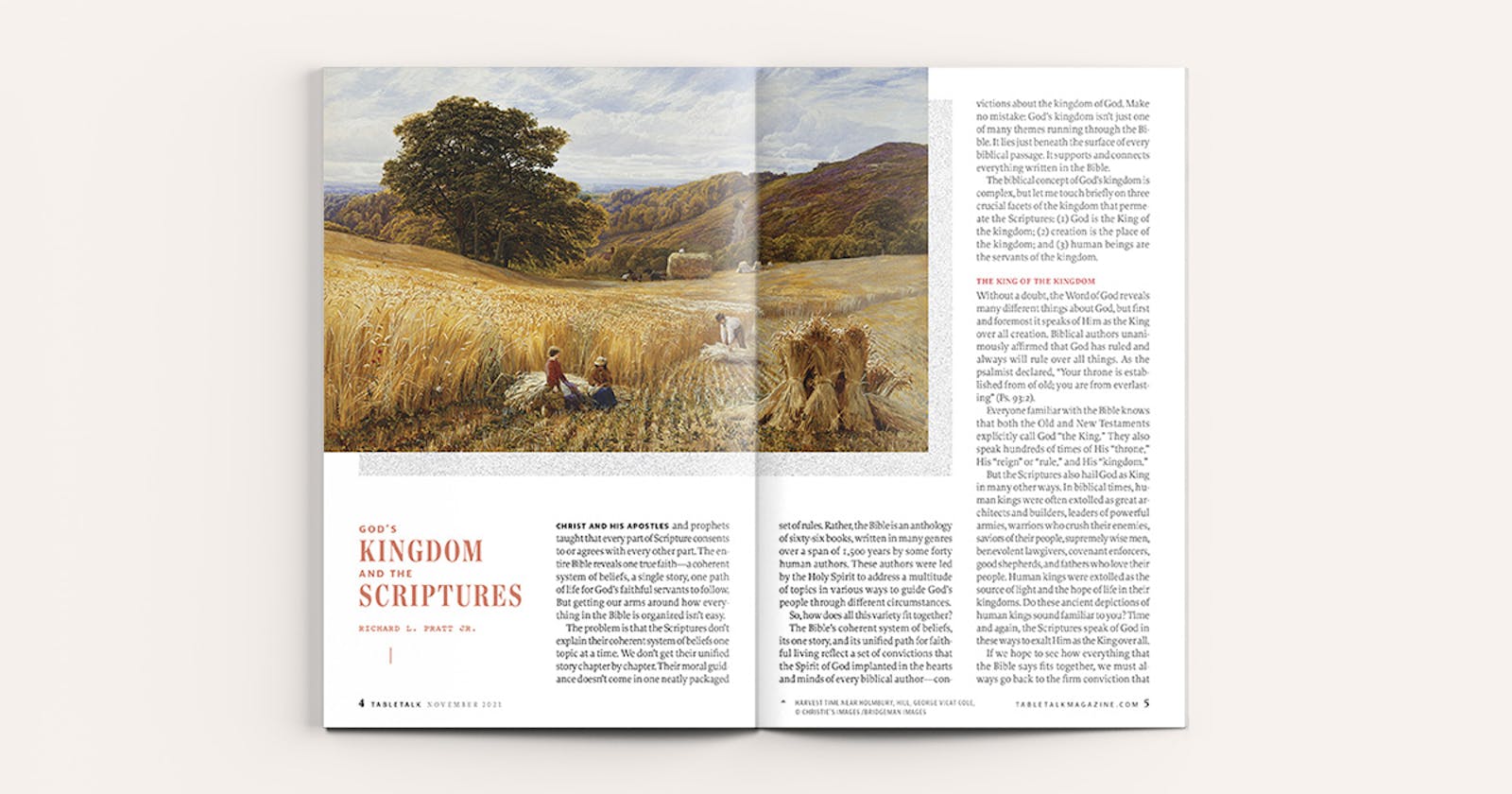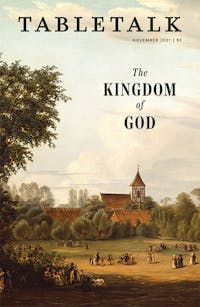
Request your free, three-month trial to Tabletalk magazine. You’ll receive the print issue monthly and gain immediate digital access to decades of archives. This trial is risk-free. No credit card required.
Try Tabletalk NowAlready receive Tabletalk magazine every month?
Verify your email address to gain unlimited access.
Christ and His Apostles and prophets taught that every part of Scripture consents to or agrees with every other part. The entire Bible reveals one true faith—a coherent system of beliefs, a single story, one path of life for God’s faithful servants to follow. But getting our arms around how everything in the Bible is organized isn’t easy.
The problem is that the Scriptures don’t explain their coherent system of beliefs one topic at a time. We don’t get their unified story chapter by chapter. Their moral guidance doesn’t come in one neatly packaged set of rules. Rather, the Bible is an anthology of sixty-six books, written in many genres over a span of 1,500 years by some forty human authors. These authors were led by the Holy Spirit to address a multitude of topics in various ways to guide God’s people through different circumstances.
So, how does all this variety fit together?
The Bible’s coherent system of beliefs, its one story, and its unified path for faithful living reflect a set of convictions that the Spirit of God implanted in the hearts and minds of every biblical author—convictions about the kingdom of God. Make no mistake: God’s kingdom isn’t just one of many themes running through the Bible. It lies just beneath the surface of every biblical passage. It supports and connects everything written in the Bible.
The biblical concept of God’s kingdom is complex, but let me touch briefly on three crucial facets of the kingdom that permeate the Scriptures: (1) God is the King of the kingdom; (2) creation is the place of the kingdom; and (3) human beings are the servants of the kingdom.
the king of the kingdom
Without a doubt, the Word of God reveals many different things about God, but first and foremost it speaks of Him as the King over all creation. Biblical authors unanimously affirmed that God has ruled and always will rule over all things. As the psalmist declared, “Your throne is established from of old; you are from everlasting” (Ps. 93:2).
Everyone familiar with the Bible knows that both the Old and New Testaments explicitly call God “the King.” They also speak hundreds of times of His “throne,” His “reign” or “rule,” and His “kingdom.”
But the Scriptures also hail God as King in many other ways. In biblical times, human kings were often extolled as great architects and builders, leaders of powerful armies, warriors who crush their enemies, saviors of their people, supremely wise men, benevolent lawgivers, covenant enforcers, good shepherds, and fathers who love their people. Human kings were extolled as the source of light and the hope of life in their kingdoms. Do these ancient depictions of human kings sound familiar to you? Time and again, the Scriptures speak of God in these ways to exalt Him as the King over all.

If we hope to see how everything that the Bible says fits together, we must always go back to the firm conviction that undergirded everything that the biblical authors wrote: God is the Sovereign of the universe and “from him and through him and to him are all things. To him be glory forever. Amen” (Rom. 11:36).
the place of the kingdom
A second crucial facet of God’s kingdom is that creation is the place of God’s kingdom. Jesus summed up this ubiquitous biblical teaching when He taught us to pray, “Your kingdom come, your will be done, on earth as it is in heaven” (Matt. 6:10). Notice where Jesus longed to see God’s will done—on earth as it is in heaven.
In God’s heavenly throne room, every creature obeys God’s commands (2 Chron. 18:18; Job 1:6; Isa. 6:1–3; Rev. 4:2–11). You would, too, if you were before God’s glorious throne in heaven. In one way or another, every passage of Scripture reveals how God is accomplishing His infallible, royal plan for history, how He will be glorified as obedience to His commands spreads throughout the earth as well.
In the opening chapters of Genesis, God planted a sacred garden with the goal that His kingdom would fill the whole earth with obedient servants one day. Sin led to humanity’s expulsion from Eden and corruption of the physical world. Yet, in the days of Moses, God led Israel back to what was likely the original location of Eden, to the place we call the promised land. God’s kingdom advanced in the promised land and beyond its borders, especially in the days of David and Solomon. But over time, Israel rebelled against God, and He drove them into exile. For centuries, God’s kingdom on earth languished. Still, even as they anticipated this terrible time in history, God’s prophets boldly proclaimed that one day “all the ends of the earth shall see the salvation of our God” (Isa. 52:10).
The New Testament explains how Christ fulfilled this prophetic hope. He began in earnest as He ministered in the promised land and sent His disciples to spread God’s kingdom to every nation on earth. Jesus continues to extend the kingdom throughout the world now through the proclamation of the gospel, and the kingdom of God will reach the ends of the earth when He returns in glory. On that day, every follower of Christ will see that “the kingdom of the world has become the kingdom of our Lord and of his Christ, and he shall reign forever and ever” (Rev. 11:15).
Nearly every page of the Bible speaks of the history of events on our planet. If we hope to understand how these countless events fit together, we must always keep in mind that all events in the past, the present, and the future unfold according to our divine King’s one great plan. They reveal how God is glorified as His kingdom comes and His will is done on earth as it is in heaven.
the servants of the kingdom
This brings us to a third facet of what every biblical author believed: Human beings are the servants of God’s kingdom. All kinds of people, doing all sorts of things, appear throughout the Bible. But above all, the Scriptures teach that human beings, in one way or another, will be used to bring about the spread of the kingdom throughout the earth.
God could have accomplished this goal by Himself in an instant, but He chose to use people over the course of history. To be sure, sin has so corrupted human beings that we all need forgiveness of sin and reliance on God’s power. Yet, while angels also have their roles, every portion of Scripture reveals that redeemed, faithful human beings are the primary means by which the kingdom of God will come.
The Lord first called the human race “[His] image . . . [His] likeness” (Gen. 1:26). In biblical times, many nations surrounding Israel referred to their kings as images of their nations’ gods. These kings were to represent the interests of their gods by learning what their gods wanted and by enforcing the will of their gods on earth. But from the true biblical perspective, all human beings are to represent the true God and to bring about His will on earth.
In the beginning, God called the parents of the entire human race to multiply and have dominion throughout the world in service to Him (Gen. 1:28). As other nations served the purposes of false, satanic gods, the true King of the universe called the nation of Israel, and now the Christian church, to serve Him as “a kingdom of priests and a holy nation” (Ex. 19:6; 1 Peter 2:9). Like Israel, you and I are to “proclaim the excellencies of him who called [us] out of darkness into his marvelous light” (1 Peter 2:9). All redeemed images of God have been called to spread the light of God’s kingdom everywhere in the world.
But how can this divine plan ever succeed? Surely, sinful human beings will always fall short. Throughout the Old Testament, the faithful people of God longed and prayed for someone who would come and fulfill God’s kingdom purposes. As New Testament believers, we know this person’s name—Jesus of Nazareth. The eternal Son of the Father took on flesh and became one of us. As the perfectly righteous Son of David, He not only atoned for the sins of His kingdom servants on the cross, but He also rose from the dead and now sits on the heavenly throne of His father David. From there, He rules over all nations, pours out His Spirit on His people, and gathers more and more people into His kingdom through our proclamation of the gospel. When He returns in glory, Jesus will finish the task. He will spread the kingdom of God to every corner of the earth.
If we ever hope to understand how everything the Bible teaches fits together, we must cast off what the world says about the human race. Why is sin so destructive? Why is salvation in Christ so crucial? Why do the Scriptures focus so much on how people live their daily lives? It is because we are the image of God, called to serve His kingdom. Isn’t that amazing? The King determined to spread His kingdom to the ends of the earth through people like you and me. As the twenty-four elders in heaven praised Jesus, “You were slain, and by your blood you ransomed people for God from every tribe and language and people and nation . . . and they shall reign on the earth” (Rev. 5:9–10).
